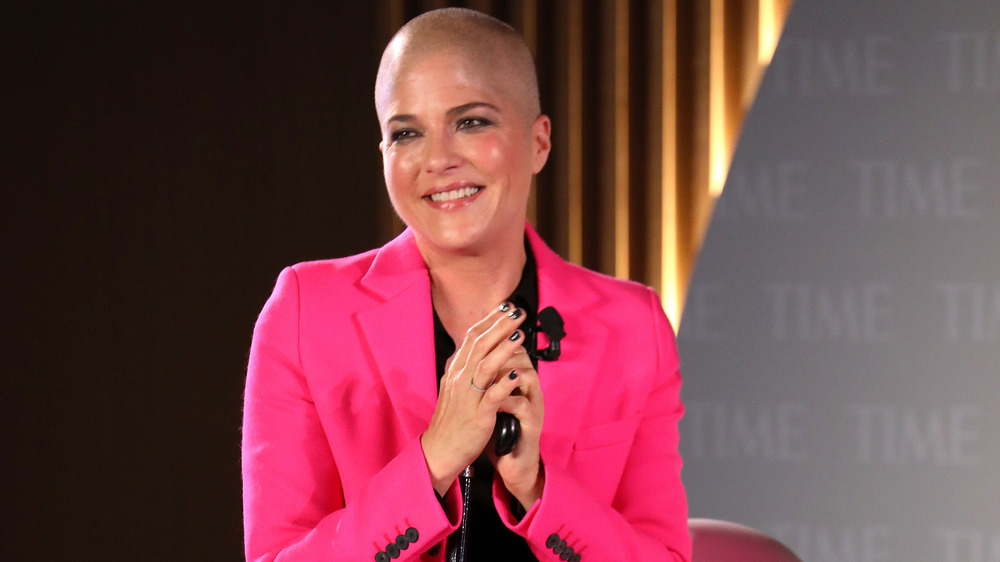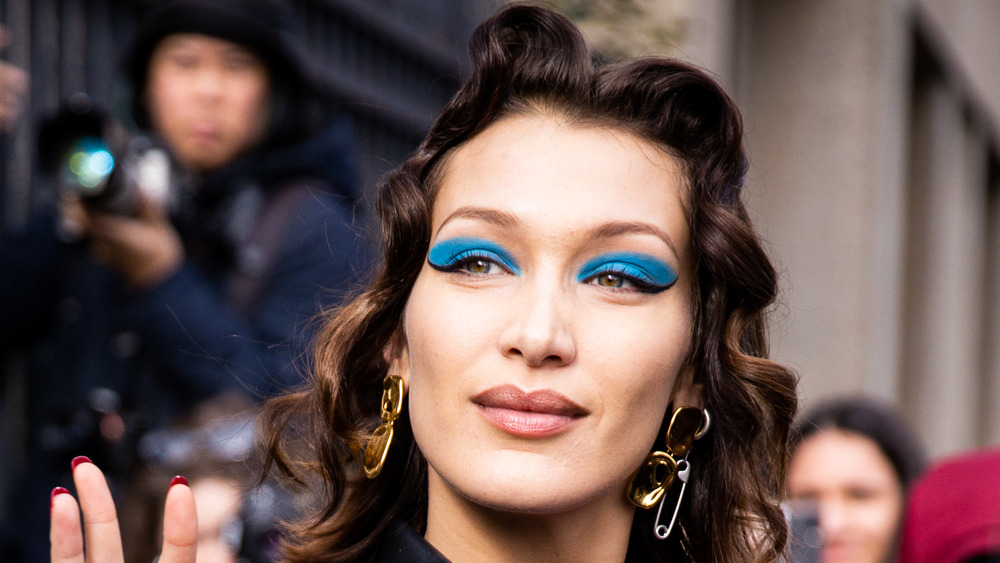Celebrities Who Were Diagnosed With Life-Threatening Diseases
Any move a celebrity makes, whether personal or professional, is often shared in the media and gets viewed by the entire world. What we don't often see front and center, however, are the serious health conditions they may be dealing with. When you're diagnosed and living with a chronic or life-threatening illness, it can be difficult to share that private part of your life — especially when you're constantly in the spotlight already (via Medline Plus).
According to the Centers for Disease Control and Prevention, six in ten adults in the U.S. have a chronic disease, and four in ten adults have at least two. When you're diagnosed with such a disease, it's considered to be a condition that lasts at least a year and requires ongoing treatment. Some examples of these conditions include heart disease, cancer, chronic lung disease, stroke, diabetes, and chronic kidney disease.
Celebrities are, of course, not immune to chronic disease. Here's a look at some of your favorite celebs who were diagnosed with life-threatening conditions.
Selma Blair: Multiple sclerosis
According to The New York Times, actress Selma Blair began to have multiple sclerosis (MS) flares after giving birth to her son back in 2011. Unfortunately, doctors weren't taking her or her symptoms seriously. Seven years later she finally got the MS diagnosis from Jason Berkley, a neurologist in Los Angeles, who found lesions on an MRI (via Women's Health). "When I got the diagnosis I cried with some relief," Blair said in an interview with Good Morning America. "Like, 'Oh, good, I'll be able to do something.'"
Multiple sclerosis is a disease that impacts the central nervous system and can disrupt communication between the brain and other body parts (via National Institute of Neurological Disorders and Stroke). Physician Amit Sachdev said in an interview with Women's Health that most MS patients have similar symptoms. "The most obvious symptoms in MS are sensory and motor," he explained. "Common manifestations are an inability to dress, dropping items, difficulty controlling part of the body, and subsequent falls."
As for Blair, she remains positive, commenting in a 2018 Instagram post, "I am in the thick of it, but I hope to give some hope to others. And even to myself."
Michael J. Fox: Parkinson's disease
Back in 1991, Michael J. Fox was diagnosed with Parkinson's disease. He kept it a secret for seven years while continuing to work as an actor. Then, in the year 2000, he launched The Michael J. Fox Foundation for Parkinson's Research, which is "the world's largest non-profit funder of Parkinson's drug development" (via The Michael J. Fox Foundation). The reason he kept it under wraps from the public for so long? "To be honest, my fear was that if they knew that I had an illness, a condition, that they wouldn't be able to laugh," Fox stated in an interview with BBC.
Parkinson's disease causes nerve cells in the brain to breakdown or die. This results in symptoms like tremors, slowed movement, speech changes, and muscle stiffness, according to the Mayo Clinic. "I accepted it and it sucks and it's hard and it's a drag being different," he revealed in the BBC interview. "It's a drag not being able to put your socks on in the morning some mornings." He followed up with, "But there's so much more in life."
Gina Rodriquez: Hashimoto's disease
It's uncertain why, but Hashimoto's disease, an autoimmune disorder, causes one's immune system to attack the thyroid. Since the thyroid is part of the endocrine system, this disease creates issues with the hormones that affect several bodily functions. If left untreated, Hashimoto's disease can lead to even more serious health problems such as a goiter (enlarged thyroid), which can disrupt breathing and swallowing, as well as heart problems, and mental health issues (via Mayo Clinic).
A common symptom of Hashimoto's disease is unexplained weight gain, which actress Gina Rodriquez dealt with. "It's always been a battle for me with weight," she commented in an interview with Health (via ABC News). "Keeping weight off is very difficult because my metabolism is pretty much shot, which to me felt like a curse when I was 19." She continued, saying, "As an actress, I was like, 'Seriously?! In a world that's so vain, I have to deal with the disease that makes you not keep weight off?"
Since then, though, she has found a silver lining. "But it actually became a blessing because then I got to represent not only women and Latinas, but also women who are dealing with this disease," she remarked.
Selena Gomez: Lupus
Lupus is an autoimmune disorder that causes the immune system attack the tissues and organs of the body. The inflammation created by lupus can damage important organs including a person's kidneys, brain, heart, and lungs (via Mayo Clinic).
Singer Selena Gomez was diagnosed with the disease back in 2015 and was very open about how it impacted her health — both physical and mental. In an interview on the podcast Giving Back Generation, Gomez explained, "I have lupus and deal with kidney issues and high blood pressure, so I deal with a lot of health issues, and for me that's when I really started noticing more of the body image stuff" (via USA Today). She went on to add, "And in reality, that's just my truth, I fluctuate [weight] ... and that got to me big time."
Two years after her diagnosis, Gomez revealed on Instagram that she had received a life-saving transplant. "So I found out I needed to get a kidney transplant due to my lupus," she said in the post. She went on to thank her friend, actress, and kidney donor, Francia Raisa, for "the ultimate gift and sacrifice."
Nick Jonas: Type 1 diabetes
Type 1 diabetes is typically diagnosed at a young age and is different from type 2 diabetes. With type 1 diabetes, the pancreas doesn't make insulin, which is the hormone needed for blood sugar to enter cells and be used as energy. Without insulin, sugar builds up in the blood since it can't enter the cells and causes high blood sugar (via Centers for Disease Control and Prevention). Complications from type 1 diabetes can wind up being life-threatening and impact the heart, blood vessels, nerves, and kidneys, according to the Mayo Clinic.
Singer Nick Jonas was diagnosed with type 1 diabetes at the age of 13. In 2018, he shared a post on Instagram reminiscing about what the experience was like. "[I was] barely 100 pounds after having lost so much weight from my blood sugar being so high before going to the doctor where I would find out I was diabetic," he explained in the caption of the post, sharing a side-by-side photo of him at 13 and 26 years old. Jonas said that he had since become "happy and healthy" through "prioritizing my physical health, working out and eating healthy and keeping my blood sugar in check."
Bella Hadid: Lyme disease
Model Bella Hadid has been open and honest about her diagnosis with Lyme disease. Lyme disease comes from infected ticks who transmits the infection to humans after a bite. Symptoms usually consist of fever, headache, fatigue, and a skin rash. If it's not treated, the infection can spread to the heart, joints, and nervous system (via CDC).
Lyme disease can be considered an "invisible" illness, which Bella addressed in an interview with People. "Life isn't always what it looks like on the outside," she explained. "And the hardest part of this journey is to be judged by the way you look instead of the way you feel." Bella isn't the only member of her family with the disease, however. Both her mother Yolanda and her brother Anwar have also been diagnosed.
Yolanda revealed some of the challenges she faces with Lyme disease. "There are rough days when you sleep 12 hours, you wake up at 11 and you can't get out of bed, with severe joint pain, brain fog, anxiety," she said in an interview with People. "There are a lot of symptoms that you can't see from the outside but bring you to your knees on the inside."
Daisy Ridley: Endometriosis and PCOS
In 2016, actress Daisy Ridley took to Instagram and shared that she was diagnosed with endometriosis at the age of 15 and, after eight years of tests, was also diagnosed with polycystic ovary syndrome, or PCOS (via ABC News).
"Endometriosis occurs when the normal uterine lining grows outside the uterus and causes pain," OB-GYN Mamta Mamik explained to ABC News. PCOS, on the other hand, is a hormonal disorder, which is usually accompanied by abnormal menstrual periods and excess male hormones, which can cause acne, excess body hair and facial hair, and enlarged ovaries. More severe complications can occur from PCOS including metabolic syndrome, which consists of high blood pressure, high blood sugar, and abnormal cholesterol and triglyceride levels (via Mayo Clinic).
Ridley encourages everyone to see a doctor if things don't feel quite right. "My point is, to any of you who are suffering with anything, go to a doctor; pay for a specialist; get your hormones tested, get allergy testing; keep on top of how your body is feeling and don't worry about sounding like a hypochondriac," she wrote in the 2016 Instagram post. "From your head to the tips of your toes, we only have one body, let us all make sure ours are working in tip top condition, and take help if it's needed."
Venus Williams: Sjögren's syndrome
Olympian Venus Williams dominated the game of tennis, but she knew something was amiss in 2004 when she began experiencing symptoms that were leaving her tired. "No matter how hard I worked, I was exhausted, short of breath, and never felt in shape. It was really frustrating," Williams said in an interview with Prevention. "My symptoms got progressively worse, to the point where I couldn't play professional tennis anymore."
In 2011, Williams was diagnosed with Sjögren's syndrome, an autoimmune condition that causes dry eyes, dry mouth, joint pain, and fatigue (via Mayo Clinic). Since this condition mainly impacts the eyes and mouth, it can lead to vision and dental problems. More severe complications involve pneumonia, cirrhosis of the liver, and kidney dysfunction, which can lead to hepatitis.
In an interview with Health, Williams said changing her diet helped her better manage her symptoms and "maintain [her] performance on the court." She continued, saying, "Once I started I fell in love with the concept of fueling your body in the best way possible. Not only does it help me on the court, but I feel like I'm doing the right thing for me."
Anthony Anderson: Type 2 diabetes
Diabetes impacts about one in ten people, and the vast majority (90 to 95 percent) of cases are type 2 diabetes (via CDC). With type 2 diabetes, the cells abnormally respond to the hormone insulin and do not allow in sugar. The body attempts to create even more insulin, which the pancreas can't keep up with, and leaves blood sugar elevated. Having high blood sugar can result in serious conditions like heart disease, vision loss, and kidney disease, according to the CDC.
Actor Anthony Anderson was diagnosed with type 2 diabetes back in 2002, and he revealed that the diagnosis really took him by surprise. He said in an interview with Diabetes Voice, "Diabetes blindsided me. Back then I felt like, 'how am I going to deal with this disease?' but you have to." He has since started a consistent routine to manage the condition.
He discussed walking and jogging on the treadmill along with working with a personal trainer. "Healthy eating is equally important," he continued. "I have more control of my health in terms of being diligent such as making time for the gym and eating the right foods. It's all about making healthier choices."
Sarah Hyland: Kidney dysplasia
Kidney dysplasia occurs when a fetus does not fully develop kidneys. Either one or both kidneys can be impacted, and children born with this condition often need blood filtering-treatments (dialysis) or a kidney transplant, according to the National Institute of Diabetes and Digestive and Kidney Diseases. This was the case for actress Sarah Hyland.
In an interview with Self, Hyland described receiving her first kidney transplant, which was donated by her father, in 2011. "What most people don't know is that about two years ago exactly [2016], I went into rejection," she revealed, attempting to hold back tears. After that kidney started failing, Hyland had to start dialysis. "I needed to be hooked up to a machine three times a week for four hours per session," she continued.
She revealed that she remained on dialysis from February through October 2017. During that time, she found out her brother was a match to donate his kidney. In September 2017, she underwent a second kidney transplant. Thankfully, she told the publication in December 2018, "I'm healed, my numbers are good, I'm stable, I'm so grateful for my entire family."
Lady Gaga: Fibromyalgia
Back in 2017, Lady Gaga postponed a leg of her tour stating "trauma and chronic pain" due to fibromyalgia (via Today). "The pain and disability seen in fibromyalgia is typically worse than almost any other chronic pain condition," said Daniel Clauw, professor of anesthesiology, medicine/rheumatology and psychiatry at the University of Michigan, in an interview with WebMD. "[The pain] doesn't just affect one area of the body you can avoid moving, and often is accompanied by severe fatigue, sleep, memory and other issues."
Indeed, fibromyalgia causes overall musculoskeletal pain, and it's believed that it affects how your brain and spinal cord process pain signals (via Mayo Clinic). In her Netflix documentary, Gaga: Five Foot Two, Gaga remarked, "I get so irritated with people who don't believe fibromyalgia is real. For me, and I think for many others, it's really a cyclone of anxiety, depression, PTSD, trauma, and panic disorder, all of which sends the nervous system into overdrive, and then you have nerve pain as well" (via Vogue).
Although fibromyalgia is not generally considered a life-threatening disease, it has been linked with other dangerous conditions. "Physicians need to seek risk factors for suicide, liver disease and cerebrovascular disease whenever a fibromyalgia patient presents for an evaluation," rheumatologist Mark J. Borigini revealed in an article for Psychology Today.
Melanie Griffith: Epilepsy
Epilepsy impacts the nervous system, causing brain activity to become abnormal. This can lead to "seizures or periods of unusual behavior, sensations, and sometimes loss of awareness," according to the Mayo Clinic. In order to be diagnosed with epilepsy, a person generally needs to have had two "unprovoked" seizures. People with the condition have a minor risk of SUDEP, or a sudden unexpected death in epilepsy. Seizures can also be especially dangerous while bathing, swimming, or driving.
Actress Melanie Griffith was diagnosed with epilepsy after years of being unsure. "I had two seizures, one they took me off the boat [at the Cannes Film Festival]," Griffith said at a Women's Brain Health Initiative panel (via The Hollywood Reporter). "I had this major grand mal seizure, and they took me to the hospital in Cannes and then brought me back to the boat. And then I had another seizure, and I went back."
She then had an EEG, a test that monitors electrical activity in the brain, and was diagnosed with epilepsy once she returned to the United States. At the 2017 panel, she revealed that since getting a divorce and taking medication, she hasn't had a seizure in four years.
Wendy Williams: Graves' disease
"I have Graves' disease and thyroid disease, and I was diagnosed 19 years ago," Wendy Williams explained on her show while talking to Dr. Mehmet Oz. "And all 19 years, Dr. Oz, everything's been under control." She followed up by saying that everything seemed fine — "until it wasn't." This prompted her to follow up with her doctors. The medical professionals ordered the talk show host to take three weeks off from work to deal with her sudden change in health.
"Graves' disease is an autoimmune disease," Terry Jay Smith, a doctor and professor at the University of Michigan Medical School, explained in an interview with NBC News. "The immune system incorrectly identifies the thyroid as foreign."
Common signs of Graves' disease include anxiety, enlarged thyroid, bulging eyes, fatigue, and irregular or rapid heartbeat (via Mayo Clinic). Severe complications include heart disorders, which can lead to heart failure, and what's known as "thyroid storm," a rare condition that can result in coma.
Pete Davidson: Crohn's disease
Comedian Pete Davidson was diagnosed with Crohn's disease when he was a teenager. This condition impacts the digestive tract, creating inflammation that leads to abdominal pain, severe diarrhea, fatigue, weight loss, and malnutrition (via Mayo Clinic). Those with the disease are at risk of developing ulcers, colon cancer, and gallbladder or liver disease.
In the years since his diagnosis, Davidson has found a routine that helps him manage the side effects of Chron's disease. However, it took a while to get to that place. "There was a point where I couldn't get out of bed. I was 110 pounds," he told Howard Stern in an interview (via Nylon). His choice of treatment: marijuana. "Weed would be the only thing that would help me eat because my stomach would be in pain all day," he said in an interview with High Times (via Insider). "I wouldn't be able to do SNL if I didn't smoke weed." Of course, there are other treatments people with the disease may find helpful, according to the Mayo Clinic.















